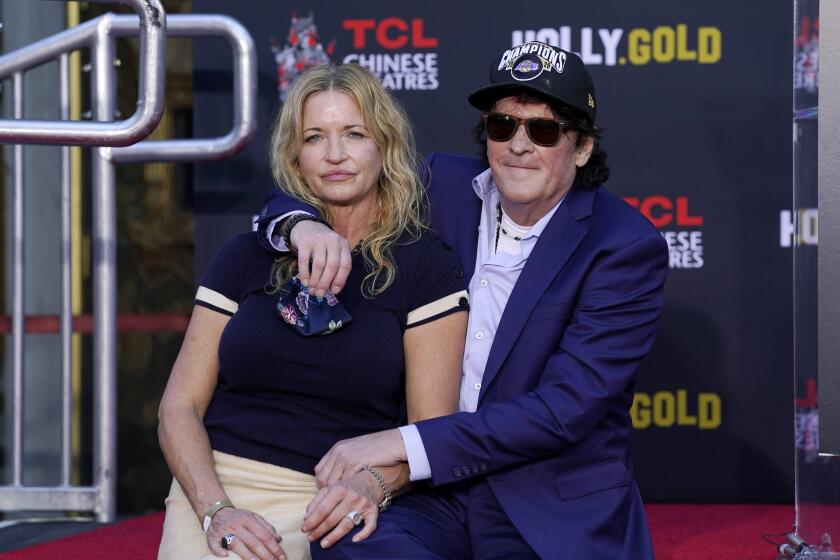Analysis: ‘American Sniper:’ What if both sides are missing Eastwood’s point?
Let’s start with this. “American Sniper” is a good movie. It’s not a great movie -- compared to the epic humanity of “Boyhood” or the strategic subtleties of “Selma,” it pales -- but it’s still very strong, better than the curdled-into-store-bought blandness of several of the other awards-ready contenders this year, and certainly better than most of the movies that studios make with big stars these days.
As you’ve no doubt heard, the returns for the Clint Eastwood-directed “Sniper” stunned over the weekend. Box office reporting is full of “surprises” -- overperformers that become that way by artful underestimation. But “Sniper,” in which Bradley Cooper plays the late SEAL Chris Kyle, was legitimately and humongously successful — its $120 million over the four days of Martin Luther King Jr. weekend helped earn it the biggest January opening ever. More to the point, made it a film whose opening-weekend numbers actually rival marketing-guns-blazing releases like “The Amazing Spider-Man 2” and “X-Men: Days of Future Past.”
Because almost no Hollywood hit can go without a group claiming it as its own--and almost no Hollywood hit can go without someone wondering if this isn’t as positive a development as people imagine--the few days that it’s enjoyed blockbuster status have also come with division and argument.
FULL COVERAGE: Oscars 2015
On one side are such outspoken liberals as Seth Rogen and Michael Moore, who knock the movie and question whether a sniper like Kyle is the unassailable hero the movie makes him out to be. On the other are conservatives like Sarah Palin and Blake Shelton, who welcome the movie with open arms for telling a story about an unassailable hero.
“‘American Sniper’ kind of reminds me of the movie that’s showing in the third act of ‘Inglorious Basterds,’” Rogen tweeted, referencing a propaganda film about a Nazi sniper. Moore added his own voice to the debate by saying that “snipers aren’t heroes.” (Both then--sort of--walked back their original comments.)
Palin replied to the initial Moore statement with a “You’re not fit to shine Chris Kyle’s combat boots” as she thanked Eastwood and star Bradley Cooper for “respecting the United States Military.” On Tuesday, Shelton weighed in, responding to the Rogen tweet, “Sickens me to see celebrities or anybody slam the very people who protect their right to talk…”
The two sides disagree ferociously with one another on the moral rightness of the film, and the noble qualities of the Kyle character. What they don’t disagree on, interestingly, is the message of the film. It’s clearly, they all seem to agree, making an argument in favor of the military—not in a general we-need-them sense (as nearly everyone on the planet believes) but in favor of the way this specific military carries out missions in places like Iraq and Afghanistan.
Palin and Shelton think a movie making such a case is a good thing. Rogen and Moore don’t. But there is little dispute about the film’s message. As the conservative film critic Kyle Smith summed up, “American Sniper” “scintillates with clarity.”
But what if the film isn’t really doing that at all? What if, in arguing about the value of the film’s message, many of the debate’s most vocal participants are missing what the message really is?
Certainly “Sniper” has its share of moments in favor of how, and why, the U.S.’ 21st-century wars have been fought. Kyle is fueled by the anger-producing specter of terrorism on U.S. citizens abroad and at home, and he sets out to become a SEAL to protect the U.S. and its freedoms. Many of the people he kills—particularly, in an early notable scene, a child carrying a bomb—are carried out with pure intentions. He hopes he doesn’t have to kill a child—in a later scene, Kyle prays silently another Iraqi child doesn’t pick up a weapon so he doesn’t have to shoot the boy—but when there’s a threat, he seeks to vanquish it.
But that’s only part of the story. As Kyle racks up the kills, he is asked often—by his wife, by others in the military—if he ever feels guilty about killing for a living. The soldier’s response is pro forma, even robotic—he is doing his job and protecting his men, he says. No two ways about it.
Such a response, said so flatly and so often, is hardly an overwhelmingly persuasive response—it ignores, for instance, the need for him and his fellow soldiers to be in that position in the first place--and it’s not entirely clear from the film we’re supposed to believe him that things are so black and white. In fact, it’s not even entirely clear from the film that we’re supposed to believe that he believes things are so black and white.
“American Sniper” is filled with moral counterpoints like this. Toward the end of the film, the widow of a soldier killed in combat reads a letter in which her late husband confesses his misgivings about the war in Iraq. It’s a haunting and intriguing moment. And it may well be that Eastwood and screenwriter Jason Hall are giving voice to an entirely different message—that Kyle is trying to do the right thing in difficult circumstances, but that he shouldn’t be in these circumstances in the first place.
When Kyle’s wife, Taya, asks him about the letter afterward, he suggests that the soldier died precisely because he stopped believing in the mission—a self-serving rationalization (belief in a mission would seem to have little to do with whether one is hit by an Iraqi sniper’s bullet) that, even if Kyle believes it, is supposed to be porous, and then some, to the rest of us. These are moments that suggest that, for all the support-our-troops fervor, the film-- in its own low-key, nonpolicy-oriented way--is also questioning why troops should be fighting there. It’s hardly as simple as Palin’s romanticizing read or Rogen’s villifying one.
In doing all of this, in other words, “Sniper” is neither the movie of Nazi propaganda nor a film of scintillating clarity. It’s a war picture of a much more interesting dimension: ambiguity.
Twitter: @ZeitchikLAT
More to Read
Only good movies
Get the Indie Focus newsletter, Mark Olsen's weekly guide to the world of cinema.
You may occasionally receive promotional content from the Los Angeles Times.











